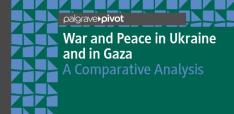National security & economic diplomacy: is there room for trade litigation?

The ongoing conflict between Ukraine and Russia has opened a can of worms and threatens to descend into an era of prolonged acrimony in the international community. Upon Russia’s annexation of Crimea, which is in theory a flagrant violation of international law, the US and the EU launched a series of economic sanctions in an effort to thwart Russian backed militias from creating further unrest in Ukraine and threatening its sovereignty. The efficacy of such sanctions has drawn criticism from many scholars on its inability to have any constructive impact on Russia’s stance. Rather it has only escalated the situation further with Russia viewing this as a provocative measure and retaliating by imposing counter measures. The counter sanctions come in the form of a food import ban against EU products. To add to insult to injury the sanctions are transforming into a full-blown trade war, with Russia already approaching the WTO against US sanctions and Poland exhorting the European Union to seek redress under the WTO’s dispute settlement mechanism. It is pertinent to note here that the defendants in both cases (i.e. US and Russia respectively), should an official WTO dispute arise, will claim the national security exception under Article XXI of the GATT.
Any trade litigation, where a national security defense is claimed may have two severe ramifications. First, a Panel looking to set up objective criteria to an otherwise subjective provision will significantly diminish the sovereignty of Member States. Second, a review of Article XXI and consequent acquiescence to the defense would encourage other Member States to levy protectionist measures under the garb of national security, thereby undermining the legitimacy and efficacy of WTO.
National Security & Article XXI, GATT
The relevant provision under Article XXI reads that nothing in the Agreement shall be construed “ to prevent any contracting party from taking any action it considers necessary for the protection of its essential security interests.”
The provision also expands on the events that would necessitate such action. Among these the relevant provisions establish the exception in time of war or any other emergency in international relations. Since there isn’t a clear definition of “essential security interests” and “other emergency in international relations”, the contracting parties are accorded immense flexibility in interpreting such situations. Further, the use of the term “it considers” also accords a subjective criteria to the provision as opposed to an objective criteria, which is present in other exceptions within the GATT. In other words a Member State is given absolute right to determine its essential security interests and invoke corrective measures accordingly without any interference from any other Member State. Thus, the provision that is replete with contextual ambiguities provides a great deal of autonomy to the invoking Member State, thereby making it virtually impenetrable.
Ending ambiguity through litigation?
Many scholars have argued for a WTO review to end the ambiguity extant in the provision, thereby preventing it from “unilateral abuse”. Proponents of a WTO review of Article XXI argue that the subjective criteria of the provision only extends to the determination of “necessary” and “essential security interests” and not to “emergency in international relations”. Thus although a Member State may be entitled to determine their interests, they are not entitled to determine when corrective measures can be invoked to address the same. Further, if we look into the object and purpose of GATT/WTO such unilateral actions are antithetical to the raison d’etreof a multilateral trading body dedicated towards liberalization and predictability in trade. Moreover, the provision stands in contradiction with the post war ideals upon which the GATT/WTO was founded.
Nevertheless, WTO adjudication over the issue would fail to appreciate the political sensitivity and policy interests at play in such situations. Till date, there is no evidence to suggest that Article XXI has been subjected to “unilateral abuse” apart from a US embargo on Cuba, through the Helms-Burton Act. Any Member State would be circumspect whilst invoking the provision in a discriminatory manner, considering the loss of reputation as a credible negotiating partner, it may attract on account of such invocation. Thus, while in theory a Member State may have the flexibility to initiate trade sanctions under the protection of Article XXI, it may be argued that in practice, this would require considerable support from other trading partners. Although, reputational loss in itself may not be enough to restrict a Member State from abusing the exception, the Member State would exercise caution in invoking the same given the long term impacts it may have on its relations with the international trading circle. In particular, the factors for consideration before any invocation would be the current trade dependency between the invoking State and the sanctioned State, and the effect of such sanctions on the trading dynamics between the invoking State/bloc and the bloc, which may be more sympathetic to the concerns of the sanctioned State. To this extent any submission to the WTO dispute settlement mechanism would be devoid of foreign policy foresight. Further, the dynamics at play in such issues assume a degree of political sensitivity, which is best suited to be solved through diplomatic channels. WTO litigation would further deteriorate relations between the trading partners and create a very murky diplomatic landscape. Moreover, if a WTO Panel develops its own interpretation of Article XXI, which allows autonomy to an invoking Member State, other Member States would use the defense to advance their protectionist interests, thereby threatening the very existence of WTO. An establishment of such a soft law norm would absolve a Member State from a fear of reputational loss arising from unilateral abuse, as it will be in accordance with WTO jurisprudence.
Given the fact that there is significant trade interdependence between the US, Russia and EU, particularly the EU-Russian trade dynamics, it would be optimal to utilize diplomatic conduits to resolve the current trend of tit for tat sanctions. In fact, even with respect to the Helms-Burton Act, through which US had levied sanctions on Cuba, the interested parties chose to resolve the issue diplomatically. The Act extended the incumbent embargo on Cuban goods import by applying it to foreign companies involved in “trafficking” property, which belonged to US citizens but was expropriated by Cuba during the revolution. Surprisingly, the US received a much stronger resistance from EU on this issue. The EU sought to approach the WTO Panel claiming a violation of the non-discrimination obligation under the GATT. Among the most controversial sections of the Act were Title III and IV. Title III established the liability for foreign companies involved in such “trafficking”. Title IV established an exception for US nationals involved in such “trafficking”. The US resisted this attempt by claiming a defense under Article XXI. Finally, both EU and US realized the pitfalls of subjecting Article XXI to judicial review and resolved the matter diplomatically. The outcome was a waiver of Title III by the US and a request placed by President Clinton to the Congress for waiver of Title IV. The successors of President Clinton have maintained the waiver although Title IV still remains before the Congress for consideration.
The other possible consequence arising out of a WTO Panel interpretation of the national security exception is a curtailment of sovereign exercise of powers by a Member State. If a WTO Panel develops objective criteria for invoking Article XXI exception, a Member State would lose the traditional flexibility offered under the provision. If we look at this from a foreign policy perspective, such an interpretation would be against national interest, which is paramount to any foreign policy framework. Thus, an adverse ruling for the invoking State will also have a detrimental impact on all other Member States of WTO, as their entitlement to determine security interests and levy actions in pursuance of the same would be severely constrained.
The inception WTO marked a significant departure from a norm based system of international law to one founded upon rules and legally binding obligations. The WTO today is regarded as a quasi-constitutional body empowered with developing legal rules for conduct of international trade. However, an important feature of the WTO is also to act as a diplomatic forum for resolving trade conflicts. The mandate of the Organization requires it to encourage liberalization without curtailing a Member’s right to regulate its trading interests. The ongoing economic belligerency should be resolved diplomatically lest it threatens the future of an effective international organization, and the sovereignty of nations.
The author is a policy analyst at Oval Observer Foundation. The views expressed in the article are those of the author and don’t necessarily reflect the views of the Foundation, its partners and affiliates.
Photo by Татьяна Щебланова


